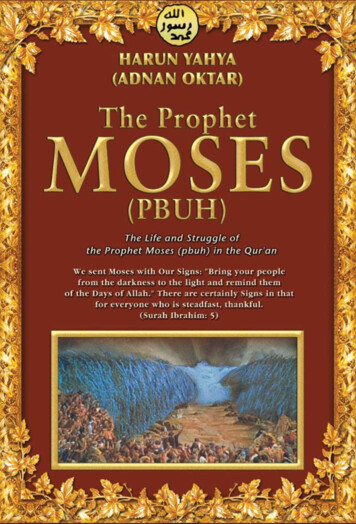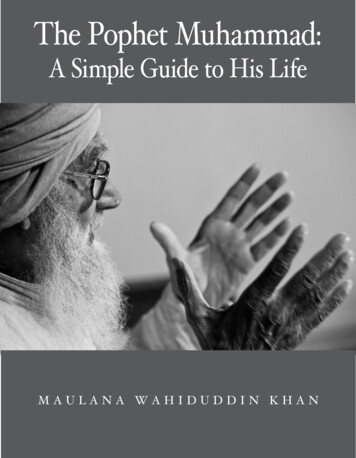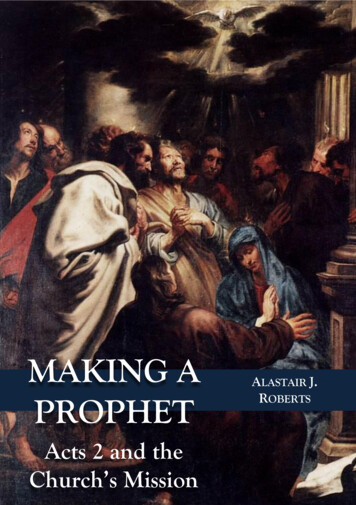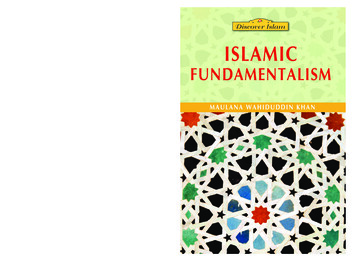
Transcription
Prophet Lut (a.s.) and Bal ﺑﻞ :The Nahida S. Nisa Tafsiras understood by Mehedi A. AliIntroduction and MethodologyNahida S. Nisa, writer and exegete, uncovered through a ready acceptance of the invitation from theQur’an itself to study it that Lut (a.s). clarifies homosexuality was not the sin of his townsfolk firstand foremost in explicit Qur’an verses. This Qur’an-centric argument, staying true to Arabicgrammar as its primary strength, is fortified by supporting context, and tested for consistency withall other remaining verses of the scripture through a semantic and thematic analysis. It was veiledonly to those who did not allow the Qur’an to speak for itself but permitted egregious and excessiveinsertions unscreened by relevant verses, subthemes, and the entire Book. As a result, revisionisttheories and misguided interpretation were forced into the verses.Because the message of Lut (a.s.) can be applied to real world events, such events can be referencedfor better understanding. I aim to minimize this here because the focus is to stay Qur’an-centric, soexamples are brief. Links for further reading are provided to the reader to pursue at their owndiscretion. Classical and modern Arabic dictionaries and popular English translations are used tostudy the verses, not to introduce bold, non-Qur’anic details of the narrative.Ironically, there might be a litany of accusations of “twisting verses to suit desires,” a commonagitated projection by deniers, as opposed to sincere disagreement. Again, this presentation of theNahida S. Nisa tafsir does not lean on such unwarranted insertions for such accusations. Theargument and methodology is presented; now Allah SWT allows the understanding of it to thosesincere.“bal” ﺑﻞ “ ﺑﻞ Bal” is a retractive particle of digression; traditional scholars have glossed over it wheninterpreting the three pairs of verses (26:165-166), (27:54-55), and (7:80-81) which traditionalscholars claim as solid proof that homosexuality is a sin. The role of this word—“bal”—is extremelycrucial and its significance cannot be understated in those three pairs, and throughout the Qur’an inother verses beyond Prophet Lut (a.s). It is critical that this is established.
We find later, that only in 29:28-29 the charge of “committing an immorality no nation preceding youhas done” along with the descriptors of an “immorality,” “transgression,” and “exceeding” behaviorreferenced repeatedly is finally described in detail and associated with that charge and itscharacterizations. This place in the verse is the only time Lut’s (a.s) townsfolk’s reply is provided.We address the role of “ ﺑﻞ bal” in the first three pairs, followed by 29:28-29. A few examplessolidifying its function in other places in the Qur’an are also provided. This is to illustrate the role itplays outside of Lut’s (a.s.) story and to confirm dictionary definitions. It consistently performs theexact same role over one hundred times in the Book. It is highly recommended that one becomefamiliar with verses regarding Lut’s (a.s.) story for better context before continuing. They can beaccessed at the Alphabetical Index of the Holy Qur’an by Syed Ammar Shah.1I am not affiliated with any references in this argument and may not share the views of the sources.1. Role of Bal and the Two-Part Format: To ClarifyMisconceptionsEdward Lane LexiconLane defines " ﺑﻞ bal" as a particle of digression in greatlength. We see it is used in the Qur’an for pairs ofopposing verses, or a verse with two opposing thoughts,to negate or amend the preceding misconception or falseidea presented in the first part, and then correcting it inthe second part. The Book is replete with numerousexamples that follow this basic structure:1) The first part features a misconception, or an incorrectthought, or idea.2) It is then followed with a contrasting statement,affirmed by " ﺑﻞ bal", which disavows and amends thepreceding erroneous idea.Lane, Penrise and Omar provide very helpful anddetailed entries in their respective works by defining itsrole rather than just providing synonyms. Theirdefinitions are confirmed repeatedly (six more times) inother, more concise works cited. Edward Lane’s work is by far the grandest endeavor undertaken, and hisfull, detail-rich entry of the word can be found in a cleaner text version in the Appendices. The works ofPenrise, Omar, Wright, Wehr, Wortabet, Haywood, Steingass, and the Al-Mawrid displayed throughout are allimmense in their own right as well. Any highlights, underlines, italicize, and bolding of dictionary entries ly-qur’an/prophet-lut2
English translations of the Qur’an is of my emphasis for illustrative purposes only unless noted otherwise.Translations will either be blue text, or have a blue main heading for sections with many translations withinthe body .PenriseAbdul Mannan OmarIn English translations " ﺑﻞ bal" is often translated as “Rather”,“But rather" or "No/Nay, but rather" and so on to negate, andthen correct to prevent misdirection. Since the word doesn’texactly translate to “no” but does serve to negate and clarify in atwo-part format, it is also often translated simply “no” or “nay” inEnglish. Because it simultaneously affirms the truth of whatcomes after, sometimes the fifth or sixth synonym listed is“certainly” or the more archaic “verily” in some entries. Howeverthat alone is underwhelming because without providedexplanation or Qur’anic context, the negation is not always clear;rather, it would appear to confirm what came previously, which isincorrect. Or, as seen in Steingass’ entry, “sometimes” which neitherregisters as total negation or even the incorrect affirmation, albeitit comes last in his list after the more accurate renditions. This iswhy seeking its role in the Qur’an is tackled next for consistentpatterns after reviewing other works. Any word or phrase that only verifies the latter but does notforce the reader’s attention into noticing the departure from what came before is not grasping theword’s true power.In general, it seems that the English phrase "But on the contrary" best encapsulates the meaning.That exact phrase is included in the definitions provided by Wright, Wortabet, Omar, as well asSteingass, and correctly adheres to the description provided by Lane, Penrise, and Omar, and howthe Qur’an utilizes it every time. For example The Sahih International translation example belowuses “on the contrary” to reinforce “but” on at least one occasion in brackets, and “but” solely is3
used in the other. Exact English translations may vary depending on the grammar and structure ofthe sentence.2 No matter what exact word or phrase is chosen, it should capture the essence.Three of MANY Examples of Qur’anic Usage of " ﺑل bal"The Qur’an verifies the meaning of this word and confirms the definitions when we look at how it isused in context. The idea is introduced in the preceding verse:Qur’an 21:43 - Or do they have gods to defend them other than Us? They are unable [even] to help themselves, norcan they be protected from Us. (Sahih International)Then this is negated with " ﺑﻞ bal" and continues with the contrast provided:But, [on the contrary], (Arabic: ﺑﻞ bal) We have provided good things for these [disbelievers] and their fathers until lifewas prolonged for them. Then do they not see that We set upon the land, reducing it from its borders? So it is they who willovercome? Sahih International (21:44)Here it is clarified that despite their shortcomings, their lives have been prolonged and with goodtidings even though Allah is capable and might be expected to decrease their protection or goodtidings. “On the contrary” is provided in brackets to assist translation. Here is another example; thistime they are within single verses with two opposing thoughts.they say, "You, [O Muhammad], are but an inventor [of lies]." But (Arabic: ﺑﻞ bal) most of them do not know. SahihInternational 16:101 (part)Or do they say, "In him is madness?" Rather (Arabic: ﺑﻞ bal), he brought them the truth, but most of them, to the truth, areaverse. Sahih International (23:70) " ﺑﻞ bal" is used here to negate the preceding idea by saying the disbelieving accusers are not aware ofthe truth, rectifying the false notion of Prophet Muhammad ﷺ being a liar. Obviously if we hadinserted “certainly” or “verily” one could see the negation but this is despite the word, not becauseof it. It is not as apparent elsewhere, so we will maintain “but on the contrary”.Prefixed Interrogative Alif2This word should not be confused with a similar word, “balay”, which has its separate entry. Although they have the same roleof contrasting, “balay” is used to negate a question asked in a negative tense. This can also be seen in the Qur’an for context.“Am I not your Lord? Yes, (balay) you are.” (Q. 7:172) As it negates a negative question, it is translated in the Englishdefinitions to include “yes” or “verily”. Penrise specifically includes that caveat that “balay” is not the same as “na’am” (yes),because “balay” negates the preceding question while “na’am” affirms it. “On the contrary” is also found in Penrise’s entry for“balay”.4
The prefixed interrogative alif is used at the beginning of Qur’an 26:1655; 27:54; and 29:28-9.Source: Free Comprehensive Resource of Arabic Grammar Hani Deek 2005-2018As we begin to look at the verses in question, it is helpful to note that some of these verses startwith a prefixed interrogative alif. Much like the French phrase “est-ce que” (is it that/is it true that?)which is also used to form certain questions, this particle of interrogation literally translates to “is ittrue that.?”.3 Because it seems the flow in English becomes a bit awkward when forming sentencesin that manner, it is usually translated in English as “do you?”However, “do you?” in English is more general and does not seek that level of specificity as theliteral translation (“Is it that?”). For better emphasis, the phrase “Do you actually”, “Do you truly”,Do you really?” might be more suitable. Despite limitations, the point being made with " ﺑﻞ bal" canstill be seen. Inserting the more accurate “is it that” on the other hand truly shows howcomplementary it is with “but on the contrary” in the original Arabic.2. Lut (a.s.) And the Two MisconceptionsAs we see in the Qur’anic examples above, what may be perceived on the surface is not so. Thereare two misconceptions being addressed in regard to what the townsfolk of Lut a.s. Used to do withnewcomers that passed by their town. One is of adultery, the other is of homosexuality.Misconception: Is this adultery?Verses 26:165-166Do you approach males among the worlds -french-est-ceque#: :text re%20you%20ready%20%3F)5
And leave what your Lord has created for you as mates? But (Arabic: ﺑﻞ bal) you are a peopletransgressing."As stated here the people of Lut a.s have spouses (azwaj) that they are leaving aside. (This will be addressedagain when Lut’s (a.s.) daughters are discussed toward the end). The misconception here is that adultery isbeing committed. Although on the surface we see that a sexual act is being performed outside of wedlock,directed towards to travelers from other regions (“from among the worlds”) passing through, thismisconception is corrected by saying ﺑﻞ bal , or “but on the contrary” their crime transgresses theaforementioned adultery (which requires at least two consensual partners) to that of something else. That riskof associating the two is thrown out. The next one to address is homosexuality. There is a danger ofconflating their crime to homosexuality, since their victims are passersby who are men. Multiple populartranslations are provided by Qur’an Corpus.Misconception: Is this Homosexuality?Verses 27:54-55Sahih International: And [mention] Lot, when he said to his people, "Do you commit immorality while youare seeing?The misconception is paired with clarification. Key words italicized or bolded.Sahih International: Do you indeed approach men with desire instead of women? Rather, you are a peoplebehaving ignorantly.Pickthall: Must ye needs lust after men instead of women? Nay, but ye are folk who act senselessly.6
Yusuf Ali: Would ye really approach men in your lusts rather than women? Nay, ye are a people (grossly)ignorant!Shakir: What! do you indeed approach men lustfully rather than women? Nay, you are a people who actignorantly.Muhammad Sarwar: Do you have carnal relations with men rather than women? You are ignorant people".Mohsin Khan: "Do you approach men in your lusts rather than women? Nay, but you are a people whobehave senselessly."Arberry: What, do you approach men lustfully instead of women? No, you are a people that are ignorant.'For the average reader that has the concept of homosexuality being a sin well-engrained in their mind, there isa risk of an unintentional “reading-into” the Qur’an, therefore the distinction here will be quite difficult tonotice. The retractive particle will simply be passed over (it does not even factor into Sarwar’s translation!),even though it creates a hiccup in the flow of the verse if homosexuality is the sin being referred to.Translating the Qur’an is a mammoth task which deserves appreciation, but sometimes preconceived notionsare a worse barrier than a lackluster translation. In reality, the verse is actually saying the opposite of what mostpeople believe.Perhaps Shakir’s and Mohsin Khan’s rendering of 27:55 really convey that distinction best - while the peopleare indeed “acting ignorantly”, that characteristic is disassociated lusting for men rather than women:“What! do you indeed approach men lustfully rather than women? Nay, (Arabic: ﺑﻞ bal) you are a people whoact ignorantly. (Shakir)“Do you approach men in your lusts rather than women? Nay, but (Arabic: ﺑﻞ bal) you are a people whobehave senselessly." (Mohsin Khan)It can be discerned with more clarity if again we see the complementary role played with “ " ﺑﻞ bal"” (But onthe contrary) when the prefixed interrogative alif is read as literally as “Is it that?” Shakir translates it as “doyou indeed” which is closer to the literal meaning. “Would ye really?” from Yusuf Ali comes close too.Mohsin Khan on the other hand does a slightly better job at translating " ﺑﻞ bal" as “Nay, but” rather than just“Nay”. Though this apparently is not as strong as “but/no, on the contrary” to best fit Lane’s, Penrise’s, andOmar’s description of the role in amending whatever was previously expressed, which is how the Qur’anemploys it; readers tend to miss it. Combining their translations with their strong points would paint a betterpicture. But ideally, the translation of this verse would read better as,“Is it that (pref. int. alif) you really approach men in your lusts rather than women? But/No, on thecontrary (Arabic: ﺑﻞ bal) you are a people who act senselessly.”Verses 7:80-817
And [We had sent] Lot when he said to his people, "Do you commit such immorality as no one has precededyou with from among the worlds?Now comes the misconception paired with clarification in the same verse.Sahih International: Indeed, you approach men with desire, instead of women. Rather, you are a transgressingpeople."Pickthall: Lo! ye come with lust unto men instead of women. Nay, but ye are wanton folk.Yusuf Ali: "For ye practise your lusts on men in preference to women : ye are indeed a people transgressingbeyond bounds."Shakir: Most surely you come to males in lust besides females; nay you are an extravagant people.Muhammad Sarwar: You engage in lustful activities with people instead of women. You have becometransgressing people.Mohsin Khan: "Verily, you practise your lusts on men instead of women. Nay, but you are a peopletransgressing beyond bounds (by committing great sins)."Arberry: See, you approach men lustfully instead of women; no, you are a people that do exceed.Here, Lut a.s confirms that his town is in fact doing something that none other have done, and this is what the“indeed” in the latter verse refers back to and its association is nullified with the retraction. Note: Thisdiscussion of “indeed”, but sans prefixed interrogative alif, paired with this “something no one has done”characterization is applied again on Page 17 for Qur’an 29:28-29.This brand new immorality that the town is being known for which to the clueless person looks likehomosexuality due to the misleading optics of the situation. To say that this town en masse inventedhomosexuality, a trait is less frequent than heterosexuality among individuals, would be bizzare. Here Lut a.s.confirms the difference between homosexual disposition and a male-on-male act, which can be done bymarried heterosexual men (26:165). Because Surah 26 specifies “males of the worlds” and “azwaj”, thisdispels the notion of homosexuality and adultery with travelers simultaneously. If this was unaccounted forand were considered generalized terms, it is dismissed by " ﺑﻞ bal" regardless. This time Mohsin Khan does agood translation, but Arberry’s seems to convey it the best of the bunch:8
“See, you approach men lustfully instead of women; no, (Arabic: ﺑﻞ bal) you are a people that do exceed.”(Arberry 7:81)While the act in and of itself is there as with acts of infidelity, the intention is something altogether,“exceeding” what constitutes the aforementioned notion. Here " ﺑﻞ bal" corrects the conflation, and explainsthat what they do goes beyond the realm of that.If there was any doubt, the Surah 27 pair explicitly reinforces the argument. This is why related Qur’an verseshave to be accounted for in totality and not read in isolation. More explicit ones will define the implicit onesto narrow down interpretations in verses of the same story, larger themes, and the entire Book.RECAPThe two motives that appear on the surface (but are not so) here are:1. Approaching travelers and leaving spouses adultery2. Approaching men and leaving aside women homosexualityAlthough 26:165 uses the word “males” it is referring to a specific party (the travelers) rather than gender, asthis description is linked to “of the worlds”, not local males within the town. This is a critical detail which wewill see again in 29:28-29. Had the identifying descriptor been “travelers” instead of “males”, the point of theverse (question of adultery) would be intact, as it specifically refers to leaving aside spouses. When 54:37 onpage {X} summarizes the mob incident Lut’s a.s. visitors are simply referred to as “guests” rather thanmaking it a point they are men.Rather, it is the other set of verses (7:80-81; 27:54-55) that deals with the question of homosexuality as nowthey are asked about generally leaving aside women for men (travelers or otherwise), and not the spouses theyare bound to by the institution of marriage in 26:165-166. The ‘transgressing’ and ‘excessive’ attributes are beyondthe realm of what constitutes adultery and homosexuality.To be clear, the misconception to be clarified is not that the people of Lut a.s. think they haven’t done anywrong and that he is pointing out new information to prove otherwise. They already know what they are doingis wrong despite having open eyes, as kufr has veiled them. He has already told them to desist many timesbefore. The Qur’an points out that they have done this in the past, and also Allah SWT does not destroy acommunity without several warnings.The next section clarifies through Qur’an 29:28-9 shows us what exactly is going on, if not adultery or homosexuality.And here “approaching men” is listed without “besides women”, and instead is linked to a criminal processfeaturing no retractive particle this time, which is the key difference in its structure when compared to Qur’an7:80-19
3. The Actual CRIME of 29:29Sahih International 29:28: And [mention] Lot, when he said to his people, "Indeed, you commit suchimmorality as no one has preceded you with from among the worlds.This time, there is no " ﺑﻞ bal" in the next verse as this is no misconception.Sahih International: Indeed, you approach men and obstruct the road and commit in your meetings [every]evil." And the answer of his people was not but they said, "Bring us the punishment of Allah , if you should beof the truthful."Pickthall: For come ye not in unto males, and cut ye not the road (for travellers), and commit ye notabomination in your meetings? But the answer of his folk was only that they said: Bring Allah's doom upon usif thou art a truthteller!10
Yusuf Ali: "Do ye indeed approach men, and cut off the highway?- and practise wickedness (even) in yourcouncils?" But his people gave no answer but this: they said: "Bring us the Wrath of Allah if thou tellest thetruth."Shakir: What! do you come to the males and commit robbery on the highway, and you commit evil deeds inyour assemblies? But nothing was the answer of his people except that they said: Bring on us Allah'spunishment, if you are one of the truthful.Muhammad Sarwar: Do you engage in carnal relations with men, rob the travellers, and commit evil in yourgatherings? His people had no answer but to say, "Bring upon us the torment of God if you are truthful".Mohsin Khan: "Verily, you do sodomy with men, and rob the wayfarer (travellers, etc.)! and practise AlMunkar (disbelief and polytheism and every kind of evil wicked deed) in your meetings." But his people gaveno answer except, that they said: "Bring Allah's Torment upon us if you are one of the truthful."Arberry: What, do you approach men, and cut the way, and commit in your assembly dishonour?' But the onlyanswer of his people was that they said, 'Then bring us the chastisement of God, if thou speakest truly.'The Conjunction “Wa”The acts being described here are sequential and associated with each other as a larger collective crime, andnot totally isolated actions that are separated by time or intent. It becomes clear that his people ambush thetraveling males, which would in fact quite literally interrupt the path they travel on, and subjugation wouldhave to be done in large numbers (a gathering of the town) to project superior force required to dominate.These are being carried out in quick succession.In Joseph A. Islam’s article, “Does the Qur’an Really Sanction Beating of Wives”, he discusses that it doesnot with a more accurate rendering of the Arabic word, ‘idribohunna’.4 Here he explains the function of“wa” in verse 4:34 where corrective steps are listed, with his emphasis:“the Arabic word 'wa' does not necessarily indicate a separation in time but an action that can be performedsimultaneously or indeed in a relatively short sequence (not separated by any significant time spans).”In another article, “The Seven Oft-Repeated”, Islam explains the meaning of the phrase “saba'an minalmathani” (the namesake of the article) that is associated with the Qur’an, and discusses whether it refers toseven or a multiplicity of verses (several) that is not separate from the Qur’an itself.5 Here, he writes again abouthow the Qur’an employs “wa”:“Some Muslims understand the conjunction 'wa' (and) as an indication to imply something separate from themain Qur’an. Such an assertion takes little account of the Qur’anic style of dialogue which clearly uses theconjunction 'wa' in different ways . .Not only is 'wa' used in the Qur’an to denote something separate or additional, it is also used to elucidate an existingstatement by defining it or clarifying it.4Joseph A. Islam. Qur’ansmessage.com “Does the Qur’an Really Sanction Beating of 3.htm5Joseph A. Islam. Qur’ansmessage.com. “The Seven Oft-Repeated”. 20FM3.htm11
For example, in the following verse, we note:055:068‘In both of them (are) fruits (Arabic: fakihatun) and (wa) date-palms and (wa) pomegranates’.Here the conjunction 'wa' (and) when used with date-palms and pomegranates only clarifies the 'fruits' and is not readas separate from the category of fruits (fakihatun)”.If this variant was applied, then “approaching men” would also entail cutting off the highway (to ambush andtrap), and to do evil to them, in one swoop. It is a tactic in part of the grander effort, the “immorality no oneelse has done” in the previous verse, to ambush and gang rape victims, close the escape route, and overpowerthem with superior numbers in a large group, altogether constituting in “approaching men” to commit “theimmorality none preceded with”. The fact that the township is on an established route (Qur’an 15:76) meansthey could have laid in waiting for new victims.The Charge is Made, and the Accused AnswerSahih International 29:29: Indeed, you approach men and obstruct the road and commit in your meetings[every] evil." Notice here “besides women” is no longer the issue in a more detailed verse explaining the crime,and is now immediately associated with cutting the path and evil in groups.This malicious act of “approaching men” et cetera with the complete picture, is quite different fromthe “men besides women” that one may do out of their innate disposition, that of which was listedalone in the other verses and subsequently nullified with " ﺑﻞ bal".Furthermore, indeed links these two together and is not contrasted like in the Surah 7 pair as there isno " ﺑﻞ bal" here. That is the key difference between the set-up in the Surah 29 and Surah 7 pairs:“Approaching men besides women” has been filtered out in the Surah 7 pair, which is accentuated bythe Surah 27 pair.“Is it that you’re actually doing this ?”Now, it is asking if they are actually (indeed) considering this with the interrogative alif and “indeed”combination in the 29th, because there is no more retraction " ﺑﻞ bal" where the crime is specified. Just like in7:80-1, “indeed” in the 29th refers back to the charge in the previous verse, the “immorality as no one haspreceded you with from among the worlds” but with no cancellation this time.Now it's a statement or exclamation of incredulity and confirmation. It would be akin to “Is it that you’reactually doing this?!” This fits the overall incredulous tone well especially when he asks them if they “.commitimmorality while you are seeing?” (Qur’an 27:54). It points out the madness of doing something of this natureespecially while sober and perceptive. The only “khamr” here blinding their judgement is the sheer intoxicationof their kufr which drove them to act madly, so much so that Allah (SWT) swore by Muhammad’s ﷺ life. Thisis the new immorality no one has done before them. The act is confirmed and comes with an explanation thatneeds no correction.12
Notably this is also the only time the charge receives a challenge from the criminals. They mocked or challengedhim to bring Allah’s punishment, essentially affirming the charge with “Go ahead and stop us”.Why " ﺑل bal" Was Necessary: Not Knowing Components Spurs Damaging ConflationSadly rape, even in recent times in many Muslim countries, has been reduced to adultery - an outrageouscomparison. Punishments are meted out to rape victims that are typically associated with adultery (i.e.flogging, stoning). Similarly, homosexuality has also been attributed to Lut’s (a.s.) community, which is alsocrudely reductionist and thus wildly inaccurate as is equating adultery to rape. This is done because extremelypertinent nuance between all these actions are unjustly stripped away and reduced to make damagingconflations.This is what happens when all context is devoid and such things are not discussed or challenged in traditionaland conservative societies. These two misconceptions continue to this day, which could explain why of thethree components listed in 29:29, it is explained that the first component (approaching the male travelers) thatexceeds beyond that of lusting for males besides the females (7:80-81; 27:54-55) and of coursetransgressed beyond leaving the spouse for an extramarital sexual act (26:165-166) to cover all bases. It is " ﺑﻞ bal" that takes the two main misleading interpretations being read into the Qur’an and puts a cap on it,and allows the rest of the story to provide the context for what is happening, unhindered.What appears on the surface is not so, and important distinctions need to be made. Similar to that of 7:80-81which confirms the literal act with a retractive particle to clarify, note how the format of this excerpt from anews article regarding a case from Pakistan.6 Emphasis added:“Furthermore, he said, in accusing her brother-in-law of raping her, Ms. Zafran had confessed to her crime.‘The lady stated before this court that, yes, she had committed sexual intercourse, but with thebrother of her husband,’ Judge Khan said. ‘This left no option to the court but to impose the highest penalty.’”The court fails to recognize this extra-marital sexual contact is rape, as readers do when they read versestypically believed to condemn homosexuality in the Qur’an. Zafran Bibi clarifying that it was rape seems tohave no bearing here, sadly. It is still clearly expressed that she “confessed” to a crime.For the matter of sexual orientation especially this leads to further nonsensical comparisons to bestiality,necrophilia, incest, being prone to anger or inclining to theft, and conjecture about afflictions affecting LGBTpeople.6Seth Mydans. 2002. “In Pakistan, Rape Victims are the ‘Criminals’”. The New York Times. n-rape-victims-are-the-criminals.html13
SynopsisQur’an verses 29:28-9 reveal the larger scope and scale of the crime being committed. Foreigners who pass bythe town are “approached”, the pathway is simultaneously blocked off, and “evil” is then committed in thegatherings, which based on the power b
discretion. Classical and modern Arabic dictionaries and popular English translations are used to study the verses, not to introduce bold, non-Qur’anic details of the narrative. Ironically, there might be a litany of accusations of “twisting verses to suit desires,” a common agitated p










